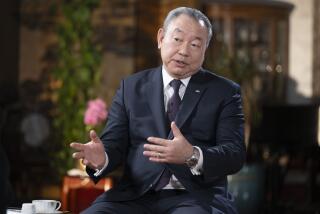China Warns U.S. Against Issuing Taiwan Visa
- Share via
BEIJING — China told the United States on Thursday that issuing a transit visa to the vice president of rival Taiwan would harm relations and that Washington should not interfere in Beijing’s interpretation of human rights.
Disputes over Taiwan and human rights have sparked most of the differences between the two nations in recent years, and a new feud could freeze a slow thaw in troubled ties in recent months, diplomats said.
Beijing stopped short of demanding the visa not be issued to Taiwanese Vice President Li Yuan-zu, who plans to attend a ceremony in Guatemala this month, but said such a move would not be welcome.
“We ask the U.S. side . . . not to do things that would harm the relations of the two countries, hurt the feelings of the Chinese people,” Foreign Ministry spokesman Chen Jian said at a news briefing.
In Washington, State Department spokesman Nicholas Burns confirmed Wednesday that Li had sought the visa.
Li plans to attend the inauguration of the new Guatemalan president set for Jan. 14 and is believed to be seeking a transit visa so his aircraft can refuel in the United States, Taiwanese officials said.
China saw the move in a political light.
“We are resolutely opposed to the Taiwan authorities using so-called transit diplomacy and other means to engage in activities in countries which have diplomatic relations with China,” Chen said.
China considers Taiwan a renegade province and has sought to push the island into diplomatic isolation.
In Taipei, a Foreign Ministry spokesman said Taiwan expects the United States to issue the visa.
“Their policy is very clear. The U.S. policy states that it will grant transit visits,” spokesman Rock Leng said on Taiwan state television.
Under the new U.S. policy toward Taiwan approved by President Clinton in 1994, Washington will allow Taiwanese leaders to stop in the United States on their way to other destinations.
More to Read
Sign up for Essential California
The most important California stories and recommendations in your inbox every morning.
You may occasionally receive promotional content from the Los Angeles Times.













